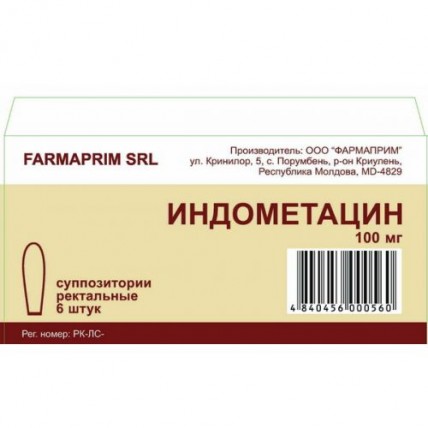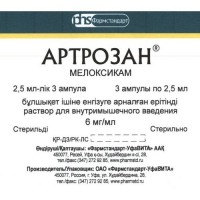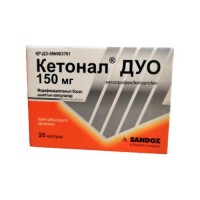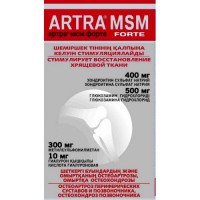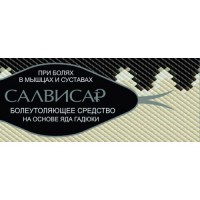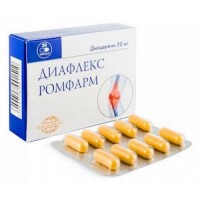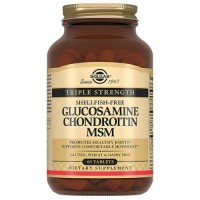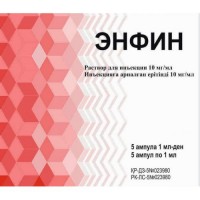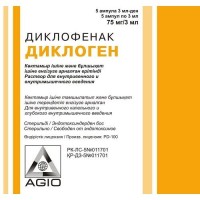Indomethacin 100 mg, 6 rectal suppositories
- $6.00
Instruction for medical use
of INDOMETACIN medicine
Trade name
Indometacin
International unlicensed
name Indometacin Dosage Form
Suppositories rectal, 50 mg and 100 mg.
The structure
contains 1 suppository:
active agent - indometacin of 50 mg or 100 mg,
excipients: cetyl alcohol, basis for a suppository:
glycerides semi-synthetic (Hard fat).
The description
Suppositories of a tsilindrokonichesky form, white color with a yellowish shade. On a cut the existence of an air, porous core and funneled deepening is allowed.
Pharmacotherapeutic group
Non-steroidal anti-inflammatory drugs. Acetic acid derivatives.
The code of automatic telephone exchange M01AB01
the Pharmacological
Pharmacokinetics Bioavailability properties of indometacin at rectal use makes 80-90%. The maximum concentration (With max) is reached in 1 h. Communication with proteins of blood plasma makes 90%. Passes hematoencephalic and placentary barriers. Gets into synovial fluid and breast milk. Elimination half-life makes 4-9 h. It is metabolized in a liver. Is exposed to enterohepatic recirculation. Kidneys remove 70% of drug in the form of metabolites and in not changed look (30%) and digestive tract – 30% in the form of metabolites.
The pharmacodynamics
Indometacin has anti-inflammatory, analgetic and febrifugal effect. The mechanism of action is connected with not selective inhibition of isoenzymes of cyclooxygenase (TsOG1 and TsOG2) that leads to oppression of synthesis of prostaglandins from arachidonic acid. Anti-inflammatory action is caused by influence both on exudative, and on a proliferative phase of inflammation. Suppresses aggregation of thrombocytes.
In rheumatic diseases the anti-inflammatory and analgeziruyushchy properties cause easing or disappearance of such symptoms as, a rest pain and at the movement, morning rigidity, a swelling of joints and improvement of functional capacities. Promotes easing or disappearance of a pain syndrome of not rheumatic character, including at the inflammatory processes arising after operations and injuries reduces inflammatory hypostasis on the place of a wound. At primary algodismenorea drug reduces pain. The anti-inflammatory effect occurs by the end of the first week of treatment.
Indications
- inflammatory and degenerative diseases of the musculoskeletal system (rheumatic arthritis, a pseudorheumatism, psoriasis arthritis, gouty arthritis, the juvenile arthritis ankylosing a spondylitis, an osteoarthrosis, osteochondrosis, etc.)
- a pain syndrome at a lumbago, a sciatica, neuralgia, myalgia
- defeat of soft tissues, a tendinitis, a bursitis
- the posttraumatic and postoperative pain syndrome which is followed by inflammation
- infectious and inflammatory diseases of ENT organs with the expressed pain syndrome (as a part of complex therapy): pharyngitis, tonsillitis, otitis
- gynecologic diseases: algodismenoreya, an adnexitis
- head (including in a menstrual molimina) and a toothache
- a feverish syndrome (including in a lymphogranulomatosis, lymphoma, metastases of tumors) - in case of inefficiency of aspirin and paracetamol.
Route of administration and
Rektalno's doses.
Suppositories of 50 mg: the adult - on 1 suppository 1-3 times a day, to teenagers (14 years are more senior) on a suppository of 1 times a day.
Suppositories of 100 mg: the adult - on 1 suppository 1-2 times a day.
The maximum daily dose makes 200 mg.
Duration of a course of treatment is established individually.
Side effects
- nausea, vomiting, heartburn, loss of appetite, abdominal pains, a constipation or diarrhea, stomatitis, an abnormal liver function (increase in activity of 'hepatic' transaminases, a hyperbilirubinemia), erosive cankers of the digestive tract (DT), bleeding and perforation of a GIT at prolonged use in high doses
- dizziness, a headache, insomnia, excitement, alarm, irritability, a faint, fatigue, drowsiness, a depression, peripheral neuropathy, muscle weakness, involuntary muscular twitchings, mental disorders (depersonalization, psychotic episodes), paresthesias, a dysarthtia, parkinsonism
- disturbance of taste, decrease in hearing, sonitus, a diplopia, illegibility of visual perception, turbidity of a cornea, conjunctivitis, orbital and periorbital pains
- heart failure, arrhythmia, a tachyarrhythmia, arterial hypertension, arterial hypotension, thorax pains
- a renal failure, a proteinuria, a hamaturia, intersttsialny nephrite, a nephrotic syndrome, a renal failure
- bleeding (gastrointestinal, gingival, uterine, hemorrhoidal), petechias, ecchymomas, a purpura
- skin rash, a skin itching, a small tortoiseshell, exfoliative dermatitis, a multiformny erythema, a toxic epidermal necrolysis, a Quincke's disease, dispnoe, a bronchospasm, a fluid lungs, Stephens-Johnson's syndrome, a Lyell's disease, a knotty erythema, an acute anaphylaxis
- aplastic anemia, autoimmune hemolytic anemia, an agranulocytosis, a leukopenia, thrombocytopenia, DVS a syndrome, a hyperglycemia, a glucosuria, a hyperpotassemia
- aseptic meningitis (is more often at patients with autoimmune diseases)
- strengthening of a potovydeleniye
- hypostases, a delay of water and electrolytes
- burning, an itching, irritation of a mucous membrane of a rectum, bleeding from anorectal area, exacerbation of chronic hemorrhoids, colitis
- increase and tension of mammary glands, a gynecomastia.
Contraindications
- hypersensitivity to indometacin, acetylsalicylic acid or other non-steroidal anti-inflammatory drugs with manifestations of an urticaria, rhinitis, the konyyuktivit, an attack of bronchial asthma (including aspirinovy bronchial asthma)
- congenital heart diseases (aorta coarctation, an atresia of a pulmonary trunk, Fallo's tetrad)
- heavy arterial hypertension
- heavy heart failure, coronary heart disease of the III functional class
- hypostases
- hemophilia, hypocoagulation, thrombocytopenia
- a leukopenia and anemia
- decrease in hearing, pathology of a vestibular mechanism
- disturbance of color sight, a disease of an optic nerve
- deficit glyukozo-6-fosfatdegidrogenazy
- a proctitis, hemorrhoids in aggravation stages, rectal bleeding
- erosive cankers of a stomach and duodenum in an aggravation phase
- ulcer colitis, Crohn's disease
- bleedings (gastrointestinal, cerebrovascular or other active bleedings)
- a serious illness of a liver and kidneys
- pancreatitis
- epilepsy
- a depression and other mental disorders
- parkinsonism
- pregnancy and the period of a lactation
- children's and teenage age up to 14 years
- states after surgical interventions.
Medicinal interactions
Enhances side effects of mineralokortikoidny, glucocorticoid drugs, estrogen and other non-steroidal anti-inflammatory drugs.
Strengthens effect of indirect anticoagulants, antiagregant, trombolitik and increases risk of developing bleedings.
Increases concentration in plasma of digoxin, a methotrexate and drugs of lithium that can lead to strengthening of their toxicity.
Sharing with paracetamol, cyclosporine and drugs of gold increases risk of development of nefrotoksichny effects.
At combined use with ethanol, colchicine, glucocorticoids and corticotropin increase risk of development of the gastrointestinal complications accompanied with bleedings.
Strengthens hypoglycemic effect of insulin and oral hypoglycemic medicines.
Reduces effects of kaliysberegayushchy, thiazide and loopback diuretics, against the background of use of kaliysberegayushchy diuretics the risk of a hyperpotassemia increases.
Reduces efficiency of uricosuric, hypotensive drugs (including beta blockers).
Miyelotoksichny medicines strengthen manifestations of a gematotoksichnost of drug.
Exponentiates toxic action of a zidovudine.
At combined use with tsefamandoly, tsefoperazony, valproic acid - increase risk of developing a prothrombinopenia and danger of bleedings.
Reduces elimination of penicillin.
Reduces renal clearance of drugs of lithium and brakes vazodilotiruyushchy effect of nitroglycerine.
Special instructions
With care appoint drug in coronary heart disease, cerebrovascular diseases, chronic heart failure, a dislipidemiya, a lipidemia, diabetes, diseases of peripheral arteries, arterial hypertension, smoking, chronic kidney disease (KK of 30-60 ml/min.), cirrhosis with portal hypertensia, hyperbilirubinemias, eroivno-ulcer diseases of digestive tract in the anamnesis, presence of an infection of H. pylori, long use of non-steroidal anti-inflammatory drugs, allergic rhinitis, polyps mucous a nose, the bronchial asthma, frequent alcohol intake, heavy somatopathies accompanying therapy by anticoagulants (including warfarin), antiagregant (including acetylsalicylic acid, klopidogret), oral glucocorticosteroids (including Prednisolonum), selective serotonin reuptake inhibitors (including to tsitalopra, fluoxetine, paroksetin, sertraline), to patients of advanced age.
During long-term treatment the control of a functional condition of a liver and kidneys and a picture of peripheral blood is necessary.
In need of definition of 17 ketosteroids, drug should be cancelled in 48 hours prior to a research.
For reduction of risk of development of the undesirable phenomena from digestive tract it is necessary to use a minimal effective dose minimum possible short course.
The feature of influence of medicine on ability to run the vehicle or potentially dangerous mechanisms
during treatment should abstain from control of motor transport and potentially dangerous mechanisms demanding concentration of attention and speed of psychomotor reactions.
Overdose
Symptoms: nausea, vomiting, severe headache, dizziness, disturbances of memory and disorientation. In more hard cases paresthesias, numbness of extremities, convulsions are observed.
Symptomatic treatment. The hemodialysis is inefficient.
A form of release and packing
Suppositories the rectal, containing 100 mg of indometacin
On the 6th a suppository in blister strip packagings from a film polyvinylchloride laminated by polyethylene.
On 1 blister strip packagings together with the instruction for use in the state and Russian languages put in a pack cardboard.
The rectal suppositories containing 50 mg of indometacin
On 6 suppositories in blister strip packagings from a film polyvinylchloride laminated by polyethylene.
On 1 blister strip packaging together with the instruction for use in the state and Russian languages in a cardboard pack.
Storage conditions
In the dry, protected from light place, at a temperature from 15 to 25 of 0C.
To store out of children's reach!
3 years
not to apply a period of storage after an expiration date.
Prescription status
According to the prescription.
The producer
of Suppositories of the rectal, containing 100 mg of indometacin
of LLC PHARMAPRIM,
Krinilor St., 5, the village Porumben, the area Kriulen,
the Republic of Moldova, MD-4829
ph.: (+373-22)-28-18-45, ph. / fax: (+373-22)-28-18-46,
www.farmaprim.md
of Suppositories of the rectal, containing 50 mg of indometacin:
LLC PHARMAPRIM
of MD-2028,
Republic of Moldova, Chisinau, G. Tudor St., 3
ph. / fax: (+37322) 20-86-72
www.farmaprim.
the Owner of the registration certificate
of LLC PHARMAPRIM
the Address of the organization accepting in the territory of the Republic of Kazakhstan claims from consumers on quality of products (goods)
Representative office of LLC Pharmaprim in Republic of Kazakhstan, Almaty, Gogol St., 86, office 528, ph. 8-727-2796518 of farmaprim.kz@farmaprim.md
to Develop md
of INDOMETACIN medicine
Trade name
Indometacin
International unlicensed
name Indometacin Dosage Form
Suppositories rectal, 50 mg and 100 mg.
The structure
contains 1 suppository:
active agent - indometacin of 50 mg or 100 mg,
excipients: cetyl alcohol, basis for a suppository:
glycerides semi-synthetic (Hard fat).
The description
Suppositories of a tsilindrokonichesky form, white color with a yellowish shade. On a cut the existence of an air, porous core and funneled deepening is allowed.
Pharmacotherapeutic group
Non-steroidal anti-inflammatory drugs. Acetic acid derivatives.
The code of automatic telephone exchange M01AB01
the Pharmacological
Pharmacokinetics Bioavailability properties of indometacin at rectal use makes 80-90%. The maximum concentration (With max) is reached in 1 h. Communication with proteins of blood plasma makes 90%. Passes hematoencephalic and placentary barriers. Gets into synovial fluid and breast milk. Elimination half-life makes 4-9 h. It is metabolized in a liver. Is exposed to enterohepatic recirculation. Kidneys remove 70% of drug in the form of metabolites and in not changed look (30%) and digestive tract – 30% in the form of metabolites.
The pharmacodynamics
Indometacin has anti-inflammatory, analgetic and febrifugal effect. The mechanism of action is connected with not selective inhibition of isoenzymes of cyclooxygenase (TsOG1 and TsOG2) that leads to oppression of synthesis of prostaglandins from arachidonic acid. Anti-inflammatory action is caused by influence both on exudative, and on a proliferative phase of inflammation. Suppresses aggregation of thrombocytes.
In rheumatic diseases the anti-inflammatory and analgeziruyushchy properties cause easing or disappearance of such symptoms as, a rest pain and at the movement, morning rigidity, a swelling of joints and improvement of functional capacities. Promotes easing or disappearance of a pain syndrome of not rheumatic character, including at the inflammatory processes arising after operations and injuries reduces inflammatory hypostasis on the place of a wound. At primary algodismenorea drug reduces pain. The anti-inflammatory effect occurs by the end of the first week of treatment.
Indications
- inflammatory and degenerative diseases of the musculoskeletal system (rheumatic arthritis, a pseudorheumatism, psoriasis arthritis, gouty arthritis, the juvenile arthritis ankylosing a spondylitis, an osteoarthrosis, osteochondrosis, etc.)
- a pain syndrome at a lumbago, a sciatica, neuralgia, myalgia
- defeat of soft tissues, a tendinitis, a bursitis
- the posttraumatic and postoperative pain syndrome which is followed by inflammation
- infectious and inflammatory diseases of ENT organs with the expressed pain syndrome (as a part of complex therapy): pharyngitis, tonsillitis, otitis
- gynecologic diseases: algodismenoreya, an adnexitis
- head (including in a menstrual molimina) and a toothache
- a feverish syndrome (including in a lymphogranulomatosis, lymphoma, metastases of tumors) - in case of inefficiency of aspirin and paracetamol.
Route of administration and
Rektalno's doses.
Suppositories of 50 mg: the adult - on 1 suppository 1-3 times a day, to teenagers (14 years are more senior) on a suppository of 1 times a day.
Suppositories of 100 mg: the adult - on 1 suppository 1-2 times a day.
The maximum daily dose makes 200 mg.
Duration of a course of treatment is established individually.
Side effects
- nausea, vomiting, heartburn, loss of appetite, abdominal pains, a constipation or diarrhea, stomatitis, an abnormal liver function (increase in activity of 'hepatic' transaminases, a hyperbilirubinemia), erosive cankers of the digestive tract (DT), bleeding and perforation of a GIT at prolonged use in high doses
- dizziness, a headache, insomnia, excitement, alarm, irritability, a faint, fatigue, drowsiness, a depression, peripheral neuropathy, muscle weakness, involuntary muscular twitchings, mental disorders (depersonalization, psychotic episodes), paresthesias, a dysarthtia, parkinsonism
- disturbance of taste, decrease in hearing, sonitus, a diplopia, illegibility of visual perception, turbidity of a cornea, conjunctivitis, orbital and periorbital pains
- heart failure, arrhythmia, a tachyarrhythmia, arterial hypertension, arterial hypotension, thorax pains
- a renal failure, a proteinuria, a hamaturia, intersttsialny nephrite, a nephrotic syndrome, a renal failure
- bleeding (gastrointestinal, gingival, uterine, hemorrhoidal), petechias, ecchymomas, a purpura
- skin rash, a skin itching, a small tortoiseshell, exfoliative dermatitis, a multiformny erythema, a toxic epidermal necrolysis, a Quincke's disease, dispnoe, a bronchospasm, a fluid lungs, Stephens-Johnson's syndrome, a Lyell's disease, a knotty erythema, an acute anaphylaxis
- aplastic anemia, autoimmune hemolytic anemia, an agranulocytosis, a leukopenia, thrombocytopenia, DVS a syndrome, a hyperglycemia, a glucosuria, a hyperpotassemia
- aseptic meningitis (is more often at patients with autoimmune diseases)
- strengthening of a potovydeleniye
- hypostases, a delay of water and electrolytes
- burning, an itching, irritation of a mucous membrane of a rectum, bleeding from anorectal area, exacerbation of chronic hemorrhoids, colitis
- increase and tension of mammary glands, a gynecomastia.
Contraindications
- hypersensitivity to indometacin, acetylsalicylic acid or other non-steroidal anti-inflammatory drugs with manifestations of an urticaria, rhinitis, the konyyuktivit, an attack of bronchial asthma (including aspirinovy bronchial asthma)
- congenital heart diseases (aorta coarctation, an atresia of a pulmonary trunk, Fallo's tetrad)
- heavy arterial hypertension
- heavy heart failure, coronary heart disease of the III functional class
- hypostases
- hemophilia, hypocoagulation, thrombocytopenia
- a leukopenia and anemia
- decrease in hearing, pathology of a vestibular mechanism
- disturbance of color sight, a disease of an optic nerve
- deficit glyukozo-6-fosfatdegidrogenazy
- a proctitis, hemorrhoids in aggravation stages, rectal bleeding
- erosive cankers of a stomach and duodenum in an aggravation phase
- ulcer colitis, Crohn's disease
- bleedings (gastrointestinal, cerebrovascular or other active bleedings)
- a serious illness of a liver and kidneys
- pancreatitis
- epilepsy
- a depression and other mental disorders
- parkinsonism
- pregnancy and the period of a lactation
- children's and teenage age up to 14 years
- states after surgical interventions.
Medicinal interactions
Enhances side effects of mineralokortikoidny, glucocorticoid drugs, estrogen and other non-steroidal anti-inflammatory drugs.
Strengthens effect of indirect anticoagulants, antiagregant, trombolitik and increases risk of developing bleedings.
Increases concentration in plasma of digoxin, a methotrexate and drugs of lithium that can lead to strengthening of their toxicity.
Sharing with paracetamol, cyclosporine and drugs of gold increases risk of development of nefrotoksichny effects.
At combined use with ethanol, colchicine, glucocorticoids and corticotropin increase risk of development of the gastrointestinal complications accompanied with bleedings.
Strengthens hypoglycemic effect of insulin and oral hypoglycemic medicines.
Reduces effects of kaliysberegayushchy, thiazide and loopback diuretics, against the background of use of kaliysberegayushchy diuretics the risk of a hyperpotassemia increases.
Reduces efficiency of uricosuric, hypotensive drugs (including beta blockers).
Miyelotoksichny medicines strengthen manifestations of a gematotoksichnost of drug.
Exponentiates toxic action of a zidovudine.
At combined use with tsefamandoly, tsefoperazony, valproic acid - increase risk of developing a prothrombinopenia and danger of bleedings.
Reduces elimination of penicillin.
Reduces renal clearance of drugs of lithium and brakes vazodilotiruyushchy effect of nitroglycerine.
Special instructions
With care appoint drug in coronary heart disease, cerebrovascular diseases, chronic heart failure, a dislipidemiya, a lipidemia, diabetes, diseases of peripheral arteries, arterial hypertension, smoking, chronic kidney disease (KK of 30-60 ml/min.), cirrhosis with portal hypertensia, hyperbilirubinemias, eroivno-ulcer diseases of digestive tract in the anamnesis, presence of an infection of H. pylori, long use of non-steroidal anti-inflammatory drugs, allergic rhinitis, polyps mucous a nose, the bronchial asthma, frequent alcohol intake, heavy somatopathies accompanying therapy by anticoagulants (including warfarin), antiagregant (including acetylsalicylic acid, klopidogret), oral glucocorticosteroids (including Prednisolonum), selective serotonin reuptake inhibitors (including to tsitalopra, fluoxetine, paroksetin, sertraline), to patients of advanced age.
During long-term treatment the control of a functional condition of a liver and kidneys and a picture of peripheral blood is necessary.
In need of definition of 17 ketosteroids, drug should be cancelled in 48 hours prior to a research.
For reduction of risk of development of the undesirable phenomena from digestive tract it is necessary to use a minimal effective dose minimum possible short course.
The feature of influence of medicine on ability to run the vehicle or potentially dangerous mechanisms
during treatment should abstain from control of motor transport and potentially dangerous mechanisms demanding concentration of attention and speed of psychomotor reactions.
Overdose
Symptoms: nausea, vomiting, severe headache, dizziness, disturbances of memory and disorientation. In more hard cases paresthesias, numbness of extremities, convulsions are observed.
Symptomatic treatment. The hemodialysis is inefficient.
A form of release and packing
Suppositories the rectal, containing 100 mg of indometacin
On the 6th a suppository in blister strip packagings from a film polyvinylchloride laminated by polyethylene.
On 1 blister strip packagings together with the instruction for use in the state and Russian languages put in a pack cardboard.
The rectal suppositories containing 50 mg of indometacin
On 6 suppositories in blister strip packagings from a film polyvinylchloride laminated by polyethylene.
On 1 blister strip packaging together with the instruction for use in the state and Russian languages in a cardboard pack.
Storage conditions
In the dry, protected from light place, at a temperature from 15 to 25 of 0C.
To store out of children's reach!
3 years
not to apply a period of storage after an expiration date.
Prescription status
According to the prescription.
The producer
of Suppositories of the rectal, containing 100 mg of indometacin
of LLC PHARMAPRIM,
Krinilor St., 5, the village Porumben, the area Kriulen,
the Republic of Moldova, MD-4829
ph.: (+373-22)-28-18-45, ph. / fax: (+373-22)-28-18-46,
www.farmaprim.md
of Suppositories of the rectal, containing 50 mg of indometacin:
LLC PHARMAPRIM
of MD-2028,
Republic of Moldova, Chisinau, G. Tudor St., 3
ph. / fax: (+37322) 20-86-72
www.farmaprim.
the Owner of the registration certificate
of LLC PHARMAPRIM
the Address of the organization accepting in the territory of the Republic of Kazakhstan claims from consumers on quality of products (goods)
Representative office of LLC Pharmaprim in Republic of Kazakhstan, Almaty, Gogol St., 86, office 528, ph. 8-727-2796518 of farmaprim.kz@farmaprim.md
to Develop md
